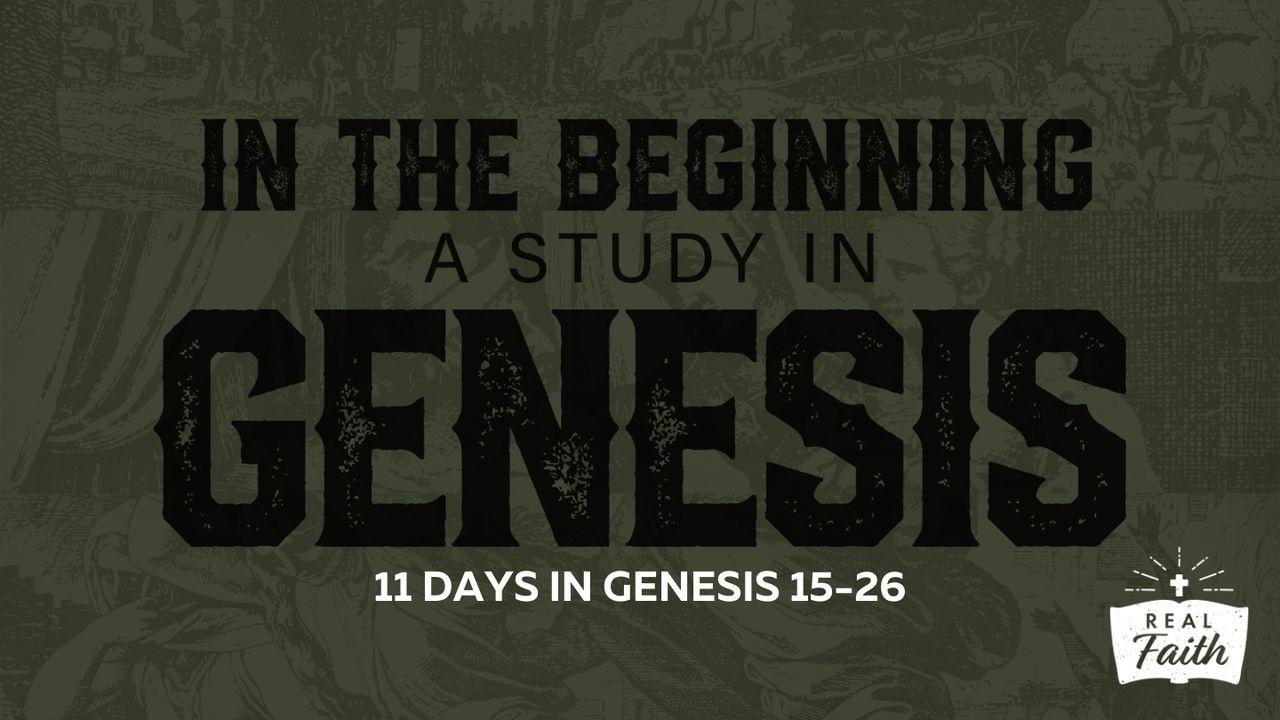In the Beginning: A Study in Genesis 15-26نموونە

Why Should We Trust God’s Promises to Us and Our Family?
When we want to repeat something, we create a prototype that serves as a pattern and precedent that is copied.
When it comes to faith, our prototype is Abraham. In Jesus’ day, they said, “Abraham is our father” (John 8:39). To this day, the three major world religions of Judaism, Christianity, and Islam all point to him as the father of their faith tradition.
Abraham believed God internally and obeyed God externally by doing what God commanded. That is true faith. Abraham models biblical faith for us. Faith is an internal conviction leading to an external action. What makes Abraham’s faith amazing is one simple fact. Abraham’s knowledge was minimal, but his faith was massive. In comparison, we tend to know a LOT more and believe a LOT less.
Genesis opens with God speaking and preparing creation for mankind by the power of His Word. Throughout Genesis, God has thus far spoken to Adam, Noah, and Abram. In Genesis 15:1, God again speaks to Abram in a vision, preparing the man for covenant as He had prepared creation for man through the shaping power of His Word. Whereas later, in Genesis 20:7a, Abram is clearly called a prophet, here he is cast in that role as the Word of the Lord had come to him, a phrase repeated some 221 times throughout the Old Testament when God gives His Word to His prophet.
In Genesis 15:2, we also witness the first time that Abram spoke to the Lord in response. Until this point when God spoke to him, Abram simply believed God and obeyed Him. As Abram’s relationship with God has grown and matured, he now takes the liberty of respectfully inquiring how God will provide for him. Abram’s speech may indicate a wavering in his faith as when he is silent it appears Abram acts in faith and when he questions God it appears that doubt is creeping into his mind. If there is doubt, it may be in part because God had already promised Abram a son earlier (Genesis 12:2) and some 25 years would pass between God’s promise of a son and the birth of that son, Isaac. Since the name Abram means “exalted father”, it could have meant that every day of his adult life was painful as he and his wife were unable to have a son, which could have caused his faith in God’s promise of a son to waiver as real faith is rarely perfect faith.
Regarding Abraham, Romans 4:18 says, “In hope he believed against hope”. When you believe the possible is possible, that is hope. When you believe the impossible is possible, that is hope beyond hope. For example, a healthy, young married couple believing they can have a baby is hope, but when Abraham and Sarah, who are barren and old enough to be great-grandparents, wait 25 additional years to have a baby, that is hope beyond hope.
God’s covenant with Abram was confirmed with a sacrifice and the shedding of blood. The enacting of covenants in the Old Testament are often referred to as the cutting of a covenant as they are instituted in blood showing their life and death seriousness. All of this foreshadows the New Covenant of our salvation, which was confirmed with Jesus’ sacrifice of His own life on the cross and the shedding of His blood. In two-party covenants, the participants would both pass through the sacrifice as an oath, but in this instance, God alone passes through as this is a one-party covenant which God promises to fulfill no matter what.
God then promised Abram that, though his descendants would inherit the Promised Land, it would not be in his lifetime, but rather only after a future 400-year exile in Egypt. In this revelation, God foretold the entire account of the 430-year captivity in Egypt recorded in Exodus, which is the next book of the Bible. God then marked out the boundaries of the Promised Land, which also coincide with the Garden of Eden (Genesis 2:10-14) and the nation we know as Israel today.
Questions:
- What do you discover about God in Genesis 15?
- What can we learn about the difference between God’s will and God’s timing from Abraham and Sarah’s long wait for a son?
کتێبی پیرۆز
دەربارەی ئەم پلانە

In this 11-day plan, you will study Genesis 15-26, focusing on God’s faithfulness to sinful families that He works through for His glory. It includes a devotional passage for each day as well as reflection questions to apply this book of the Bible to your life. Whether you’re just curious about the Bible, a new believer, or a long-time follower of Jesus, God will speak to you through it.
More









